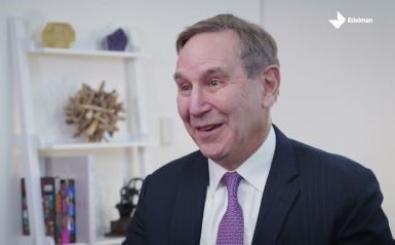The COVID-19 pandemic placed health at the top of the EU policy agenda and ambitious plans have been rolled out by the European Commission to create a strong European Health Union. The European Health Union project has the potential to bring the EU action in health to the next level; however, the last eighteen months demonstrated how challenging developing an EU-wide approach to health can be, and while the EU action has been applauded by some, it has also been heavily criticized by others. As a result, is there enough confidence and trust in the European Health Union project? This is the question with which Nicola Scocchi, Director and Head of Health & Wellbeing, Edelman kicked off the event.

TRUST IN HEALTHCARE
Kirsty Graham, Public Affairs CEO and Chair of Health, Edelman provided an overview of the health data captured by the Edelman Trust Barometer 2021. The report recorded a dramatic drop in trust levels for all major institutions, with governments suffering the biggest losses. Remarkably, businesses became more trusted than governments in 18 of 27 countries surveyed.

In the early months of 2020, the healthcare sector saw record-high levels of trust in healthcare, although this was followed by an ensuing decrease by January 2021 which shows the volatility of trust in healthcare over the past year. Despite declines in all subsectors of health, hospitals remain the most trusted at 69%, while the pharmaceutical sector scored lower (at 57%) despite capturing most of the media coverage and discussion.

Most respondents felt that the pandemic burdened the most vulnerable and, as a result, improving healthcare systems emerged as the top societal priority. Another key finding was that trust in all information sources at record lows and that poor information hygiene often negatively impact citizens’ willingness to be vaccinated, therefore hindering countries’ recovery from the pandemic.

ENHANCED COOPERATION BETWEEN EU AND NATIONAL INSTITUTIONS FOR A STRONG EUROPEAN HEALTH UNION
In his address, Xavier Prats Monné, Former Director-General for Health, Food Safety and Education at the European Commission, argued that the existing limitations around EU competencies in health hindered the EU’s ability to deal with the pandemic, and explained that the Commission’s proposals for a European Health Union would have been unimaginable before the COVID-19 crisis.
In order to be effective, the proposals included in the European Health Union package should protect citizens’ livelihoods, prepare healthcare systems for future shocks and promote sustainability both in the EU and globally. Additionally, according to Xavier Prats Monné, ensuring closer cooperation between EU and national institutions will be key to earn trust from EU citizens and therefore build confidence around the European Health Union project. Lastly, a new social contract between citizens, stakeholders, and institutions is needed to ensure that health can be prioritized in the policy agendas beyond the COVID-19 crisis.

TRANSPARENCY AND INCLUSIVENESS TO BUILD TRUST IN A CHANGING SOCIETY
Milka Sokolović, European Public Health Alliance Director-General, stressed that the COVID-19 pandemic has underlined how profoundly health is linked with citizens' safety and security, and therefore there is no surprise that health is one of the top concerns of European citizens. Dr. Sokolović continued by discussing that the volume and speed of information spread are unprecedented; as a result, citizens now have limitless access to potentially helpful information, but also inaccurate, contradicting information. This causes confusion and leads to a decrease in trust. For public authorities to earn and sustain trust, they must be fully committed to pursuing the common good and public interest.
When it comes to the development and implementation of the European Health Union, Dr. Sokolović added that NGOs can and will play a role by demanding policy changes that will leave a positive impact and by partnering and building bridges with other stakeholders, also at a national and regional level.

THE URGENCY OF MAINTAINING COLLABORATION AND PARTNERSHIPS IN THE POST-PANDEMIC WORLD
Elke Grooten, Head of EU Relations at Novartis, argued that the expectations of EU citizens in a post-COVID-19 world are to make healthcare systems more resilient, which will be essential for building public trust. According to Elke Grooten, maintaining the high level of collaboration and partnership which took place during the pandemic will be key to deliver on these expectations.
In addition, Elke Grooten noted that further to the value that the pharmaceutical industry brings in relation to research and bringing innovative treatments to patients, there are also other societal expectations – such as global access, environmental sustainability, ethical use of digital and AI, and social rights – expectations on which Novartis is committed to delivering. Finally, the unprecedented level of collaboration seen during the COVID-19 pandemic cannot be allowed to disappear after the crisis, she urged, stressing the importance of co-creating solutions together with all stakeholders.

THE GENERAL PUBLIC’S WILLINGNESS TO UNDERSTAND SCIENCE AND THE INCREASING RECOGNITION THAT FAKE NEWS CAN BE DAMAGING
Shéhérazade Semsar-de Boisséson, CEO at POLITICO Europe, stated that the past year has been a record year for all mainstream media, including POLITICO. Attributing this increase to citizens being interested in getting accurate news, Shéhérazade Semsar-de Boisséson also noted that social media platforms privilege accurate information in terms of search results. Furthermore, she argued that although there may well have been an infodemic, the past year also showed how damaging fake news can be and demonstrated that the public is willing to understand the science.
Shéhérazade Semsar-de Boisséson noted that during the COVID-19 crisis EU institutions put great efforts into relaying information to national media and EU citizens; however, the fragmentation of the media landscape in Europe remains a challenge, especially when it comes to reaching the general public.

Presenting his key takeaways from the conversation, Gurpreet Brar, General Manager of Edelman Brussels and Public Affairs COO, Edelman, stated that as businesses are called to fill in the trust gap left by governmental actors, it will be key for them to work with other stakeholders to provide trustworthy information. Additionally, Gurpreet Brar argued that leaders should be “leading with facts and acting with empathy” to help rebuild trust in a post-COVID-19 world.

DOWNLOAD THE EDELMAN TRUST BAROMETER 2021: EU HEALTH SPECIAL EDITION
Fill in the form below and we will email you the EU Health Special Edition of the 2021 Edelman Trust Barometer in a few minutes. Do you have issues? Get in touch and drop us a line at brussels@edelman.com, we will get back to you as soon as possible.
Please opt-in to email outreach from us.






